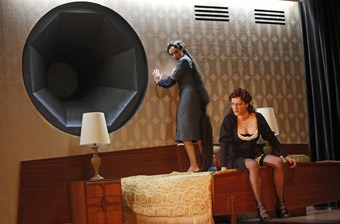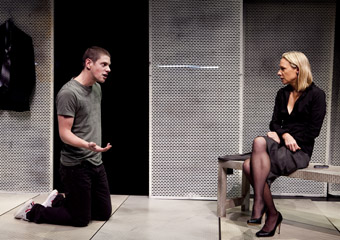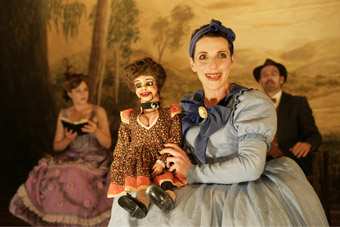the real & other realities
keith gallasch: venus & adonis, holiday, concussion, charlie mudd, the alchemist

Melissa Madden Gray, Susan Prior, Venus and Adonis, Sydney Theatre Company
photo Jeff Busby
Melissa Madden Gray, Susan Prior, Venus and Adonis, Sydney Theatre Company
MARION POTTS’ STAGING OF SHAKESPEARE’S POEM VENUS AND ADONIS AND RANTERS’ HOLIDAY ARE HISTORICALLY WORLDS APART; THE FORMER IS ENGLAND’S MOST POPULAR POEM OF THE 1590S, HERE HYPER-DRAMATISED AS A DUET FOR TWO FEMALE ACTOR-SINGERS; THE LATTER IS AN ULTRA-NATURALISTIC, AWKWARD MEETING OF TWO MALE STRANGERS, INTERLEAVED WITH SOLO, BAROQUE LOVE LAMENTS. BOTH PLAYS ARE ABOUT LOVE, ONE OVERTLY, THE OTHER IMPLICITLY; BOTH FEATURE DESIGN BY ANNA TREGLOAN AND SOUND BY DAVID FRANZKE, AND I SAW THE SHOWS WITHIN A FEW DAYS OF EACH OTHER, AND WAS STRUCK BY SYNCHRONICITIES OF ARTISTRY AND THEME.
For the Bell Shakespeare and Sydney Theatre Companies, Tregloan has created a convincingly realistic, moderately luxurious hotel room where Venus and her double (Melissa Madden Gray and Susan Prior) long for a sexual encounter, ogling the audience, making us their Adonis (a conceit that lasts for some two-thirds of the show until, after he is gored by a boar, the young man’s ashes are grieved over in the hotel bed). The set for Venus and Adonis might be a smallish box that we peer into and from which the performers leer out, but we are subtly enveloped by Franzke’s sound world, which is as verité as Tregloan’s hotel room: voices in the corridor, footsteps, the whining of elevators, the inevitable 4am grind of a garbage truck.
This resonant realism of set design and sound is juxtaposed with larger than life performances (apt for two goddesses, elegantly gartered and stockinged, surreally coiffed with trailing, body length hair) and Andrée Greenwell’s memorable lyrical songs (evoking without pastiching Elizabethan music, beautifully accommodating Shakespeare’s long lines, and sung against a trio of musicians on percussion, recorder and electric guitar barely hidden in the greenery outside the window). Potts’ production gives full vent to the vividness, rawness even, and the numerous double entendres of Shakespeare’s verse as well as conveying Venus’ passage from lust to, perhaps, love and then despair. Like a human, she learns the inequalities and agonies of love but, like a goddess, she curses us with them forever. The real and the hyperreal coalesce in this Venus and Adonis, to make modern sense of a four-century-old poem.
Across town, for Holiday, written by Raimondo Cortese, directed by Adriano Cortese and co-presented by Ranters Theatre and Griffin Theatre Company, Anna Tregloan has whited-out the Stables theatre, making it feel unusually, indeed eerily, capacious. We are very conscious of being inside it. At its centre is a wading pool, and to one side a chaise longue. In a series of encounters, interpolated with solo songs, two reticent men (actors and co-devisors Paul Lumm and Patrick Moffat) find themselves chatting. It all seems inconsequential.
Around us are Franzke’s surround sounds of nature—water, birds, distant conversations. At times these subtly underscore pauses and brief silences in the conversation, at others they are everything: the men stop talking, look out at us, appear to listen, for a long time. We are the others, unreferred to, on this holiday, as these men barely get to know each other, reveal little of themselves (save a handful or two of mysterious recollections and observations) but, in the play’s final moment, open up to empathy, the beginnings perhaps of friendship or even love. As with Venus and Adonis, the play between the real and the hyperreal, here the innocent conversation and the sounds of nature pitched against the calculated, banal otherworldliness of the design and the bursts of unacknowledged song, generates for its audience a state of enveloping reverie and, at the same time, an enriching hyper-awareness.

Sam North, Belinda McClory, Concussion
photo Alina Gozina
Sam North, Belinda McClory, Concussion
The Griffin and Sydney Theatre Companies have come together to co-produce and premiere Ross Mueller’s impressive fable, Concussion. Mueller crafts superb dialogue, is adept at brisk characterisations and, best of all, has the ability to give pretty much equal weight to all six of his characters as their lives complicatedly intertwine. He has a particularly good ear for the voice of the young, in this case Sergio with his eager if blunt intelligence (expertly realised by Sam North), and adds to the under-age sex debate in a frank depiction of a female lawyer (Belinda McClory) inadvertantly trapped in a relationship with an adolescent. Typical of the play’s world, the same lawyer is less principled in a crisis when she has to deal with the likely guilt of her client, police detective Caesar (Terry Serio) who is suffering from amnesia after perhaps having perpetrated a violent crime. The core of the play is the return to memory, and around it constellate tense, overlapping relationships between husband and wife, wife and ex-husband, husband and lawyer, brother and brother, father and son.
Director Brett Adam draws fine, equally weighted performances from his actors: the sense of ensemble is palpable. However, the demands on the performers are sometimes considerable especially Mueller’s filmic intercutting of couple dialogues, running two or three at a time, but more rarely (and more effectively) delivered simultaneously. Occasionally this editing seemed to strand the performers, a condition exacerbated by the growing spatial distances between pairs on Brad Clark and Alexandra Sommers’ rather thematically undefined set (slightly unhinged metal pannelling on split-level modern scaffolding evoking home, office, cafe etc and a bridge above). As in Venus and Adonis and Holiday, music is also a felt presence in Concussion: loud bursts of it and pulsing light accompany dream-state-ish dancing, grapplings and tusslings. Although they’re in the script, there’s an air of dated superfluity about these interludes, interrupting the otherwise dynamic seamlessness of Mueller’s time-shuffling narrative drive. Reservations aside, I left the theatre exhilarated by Concussion’s fine performances, idiosyncratic characters, the acuity of the writing and the surprising moral turns. Unlike Holiday (which shares much with contemporary performance), Concussion is straight theatre, but entertainingly lateral and, in the end, positively crooked.

Julia Zemiro, Christen O’leary, Jim Russell, Goodbye Vaudeville Charlie Mudd
photo jeff busby
Julia Zemiro, Christen O’leary, Jim Russell, Goodbye Vaudeville Charlie Mudd
For Malthouse and Arena Theatre Company, Goodbye Vaudeville Charlie Mudd is the latest work from the dynamic duo of director Chris Kohn (now Arena’s artistic director) and writer Lally Katz. In recent years they’ve created a fine body of work for Stuck Pigs Squealing with a rich theatricality, drawing on and perverting tradition, and a bracing sense of the absurd (at its peak in Lally Katz and the Mystery of the Two Volcanoes). While not producing psycho-realism, the pair have nonetheless, quite laterally and elusively, suggested disturbing complexities of character, for example in the deluded central figure in The Black Swan of Trespass and acutely in the incestuous brother and sister relationship in Eistedfodd.
Directed by Kohn with his usual finesse and inventiveness, this new play is half good: well, the second half is good. The first, unusually for Katz and Kohn, pretty much conventionally unfolds the plot, broadly delineates characters and the 1914 Melbourne context and is full of entertaining vaudevillian business—songs, magic, acrobatic feats, ventriloquism and bad manners. It’s anchored by a superb performance from music director Mark Jones in blackface (and perfect black vaudeville voice; see p6 on blackface in The Wooster Group’s Emperor Jones) the narrative centring on the arrival of a replacement female performer (Julia Zemiro), “insect impersonator and singer of dramatic arias” who is immediately forced to adopt the name of her predecessor amidst hints of dirty deeds by the show’s owner, Charlie Mudd (Jim Russell).
The set, a small Edwardian theatre, is a fine one, again conventional, going for a sense of historical accuracy. The second half goes backstage, leaps forward in time (Mudd’s business has declined, The Swanston River is likely to flood the building and the manager’s relationship with the new girl has soured). It’s here that things take a surreal turn, evoking Edwardian ghost stories, venturing a sizeable metaphysical leap into the future and displaying Katz’s sense of the ridiculous—for example, how to defeat a pygmy curse against having sex with tall people by doing it with the ventriloquist’s doll. Chirsten O’Leary as the ventriloquist with the foul-mouthed doll that bespeaks her mistress’s desires, Matt Wilson as the emotionally and physically stunted brother of Mudd, Alex Menglet as the cursed magician and Zemiro as Mudd’s latest victim, all propel the second half’s flight into desperation and bewilderment. Finally, if lacking some of the authority and showbiz verve warranted by the main role, Russell has something to get his teeth into as Mudd grapples with his crimes and a bizarre otherworld. Goodbye Vaudeville Charlie Mudd is an enjoyable and eventually rewarding work, but in terms of the Katz and Kohn oeuvre it’s a long wait (including an interval) for the pay-off. Curiously, for all the nostalgia the play evokes and the growing compassion for its depleted characters, the play’s portayal of vaudeville has it, in effect, dying by its own murderous hand. Just too many bodies buried beneath the stage?
Ben Jonson’s The Alchemist (1610) is nearly all business. The play is a powerhouse of conning, double-dealing and fast improvisation as exploits stack up perilously close to collapse, all of it ably captured in this pacy joint Bell Shakespeare and Queensland Theatre Company production. The role-playing core of the crookery is emphasised in the dressing room set with its large mirror (facing the audience but not otherwise exploited), packed clothes racks and assorted props. Director John Bell does not, as some have done, overlay the play with the devices and rituals of alchemy—there are no onstage test tubes, vats and furnaces, and no grand costuming of the crooks.
Face (Andre Tighe), a household servant whose master has left London in fear of the plague, has invited in the lazy Subtle (Patrick Dickson) so they can con the local citizenry with prophesies, charms and alchemy. Almost in view of his victims, Face creates the sound of laboratory bubblings simply by blowing into a straw in a milkshape carton. Bell’s vision, so apt for our own age of spin, is that the conning is pretty much all in the language, and there’s no shortage of it in Jonson’s rich parodying of alchemy and his illustrations of the gift of doubletalk. The result is that the victims of Face and the Alchemist seem even more gullible than usual, especially the elegantly attired Sir Epicure Mammon (David Whitney), totally oblivious to the tatty guises of the crooks (at least Georgina Symes as Doll Common, provides a fashionable decoy with her high blonde coiff and long red frock amongst other outfits). Dickson’s Alchemist changes little in tone or manner or costume (looking mostly like a bargain basement guru), there seems no need, but Tighe’s Face is an able chameleon in all respects. Russell Kiefel as the master of the house brings a Guys and Dolls verve to the proceedings, in the end conning the con men.
This is a serviceable account of The Alchemist and an opportunity to see a rarely performed classic—Jonson’s most popular play, Stanley Wells tells us in his informative Shakespeare & Co (Penguin, 2007), until the disapproving 19th century. And it’s a joy to see a city comedy, one of many from the period and one, writes Wells, that Jonson set in the year of its composing. The spin in politics and economics over the last two decades has had appalling consequences; The Alchemist is a comic reminder of just how easy it can be to deceive—all that was spun, like mortgage derivatives, was not gold.
One thing is clear from all the above: the developmental programs (Bell Shakespeare’s Mind’s Eye, STC’s Next Stage), creative teams, collaborations, co-devisings and co-productions have become an essential part of contemporary Australian theatre’s creative and networking ecology, taking more and more productions to wider audiences and across borders (and Venus and Adonis to the Auckland Festival) and, visibly, to younger audiences. It’s almost surreal.
Bell Shakespeare Company, Sydney Theatre Company, Malthouse, Venus and Adonis, director Marion Potts, performers Melissa Madden Gray, Susan Prior, set and costumes Anna Tregloan, lighting Paul Jackson, composer Andree Greenwell, sound design David Franzke, dramaturg Maryanne Lynch, musicians Felicity Clark, Michael Sheridan, Bree Van Reyk; Wharf 2, STC, Feb 13-28; Ranters Theatre with Griffin Theatre Company, Holiday, text Raimondo Cortese, concept, direction Adriano Cortese, set Anna Tregloan, lighting Niklas Pajanti, sound David Franzke, performers, co-devisors Paul Luun, Patrick Moffat, Stables Theatre, Feb 4-28; Sydney Theatre Company’s Next Stage & Griffin Theatre Company, Concussion, writer Toss Mueller, director Brett Adam, designers Brad Clark, Alexandra Sommer, lighting Luiz Pampolha, sound Basil Hogios, movement Fiona Malone, Wharf 2, STC, from March 17; Malthouse and Arena Theatre Company, Goodbye Vaudeville Charlie Mudd, writer Lally Katz, direction, concept Chris Kohn, cast Mark Jones, Alex Menglet, Chirsten O’Leary, Jim Russell, Matt Wilson, Julia Zemiro, set, costumes Jonathon Oxlade, composer Mark Jones, sound design Jethro Woodward, lighting Richard Vabre, dramaturg Maryanne Lynch, CUB Malthouse, March 6-28; Bell Shakespeare Company and Queensland Theatre Company, The Alchemist, writer Ben Jonson, director John Bell, performers Patrick Dickson, Andrew Tighe, Georgina Symes, Bryan Probets, Lucas Stibbard, David Whitney, Sandro Colarelli, Richard Sydenham, Peter Kowitz, Scott Witt, Liz Skitch, Russell Kiefel, designer Bruce McKinven, lighting Matt Scott; Playhouse, Sydney Opera House, March 20-April 18
RealTime issue #90 April-May 2009 pg. 45






